必修2 Module 3 Music Grammar 课件(27ppt)
文档属性
| 名称 | 必修2 Module 3 Music Grammar 课件(27ppt) | 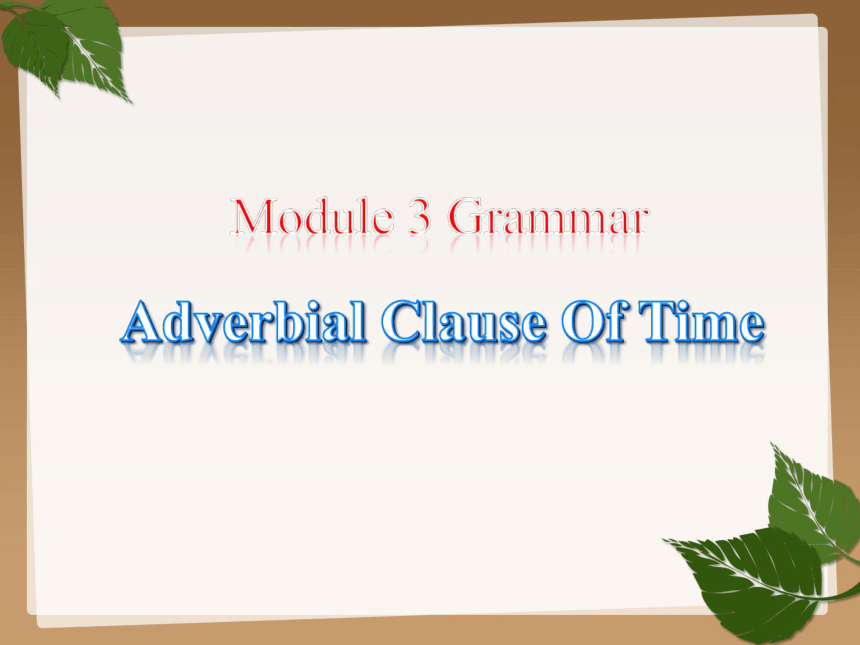 | |
| 格式 | zip | ||
| 文件大小 | 339.0KB | ||
| 资源类型 | 教案 | ||
| 版本资源 | 外研版 | ||
| 科目 | 英语 | ||
| 更新时间 | 2018-07-21 08:46:38 | ||
图片预览


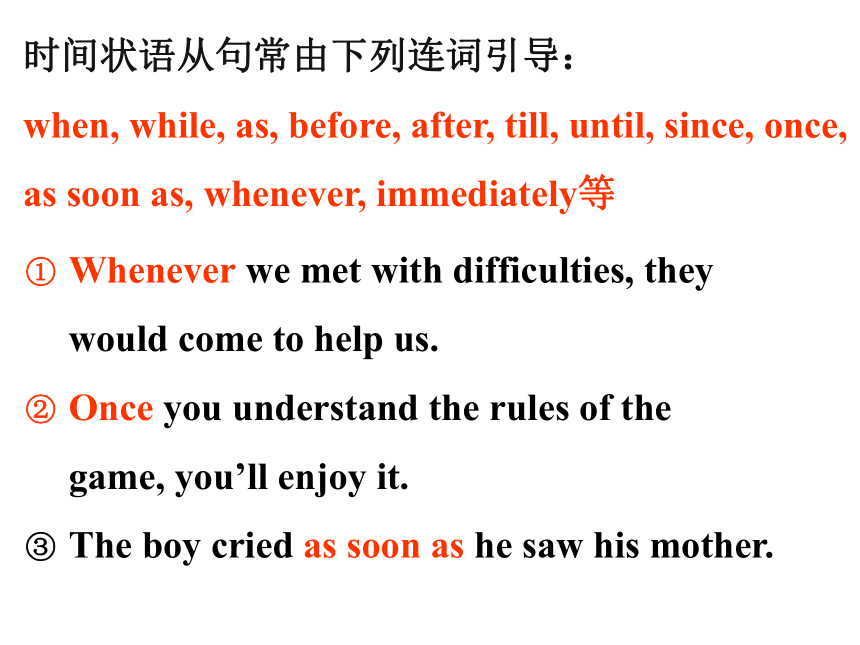
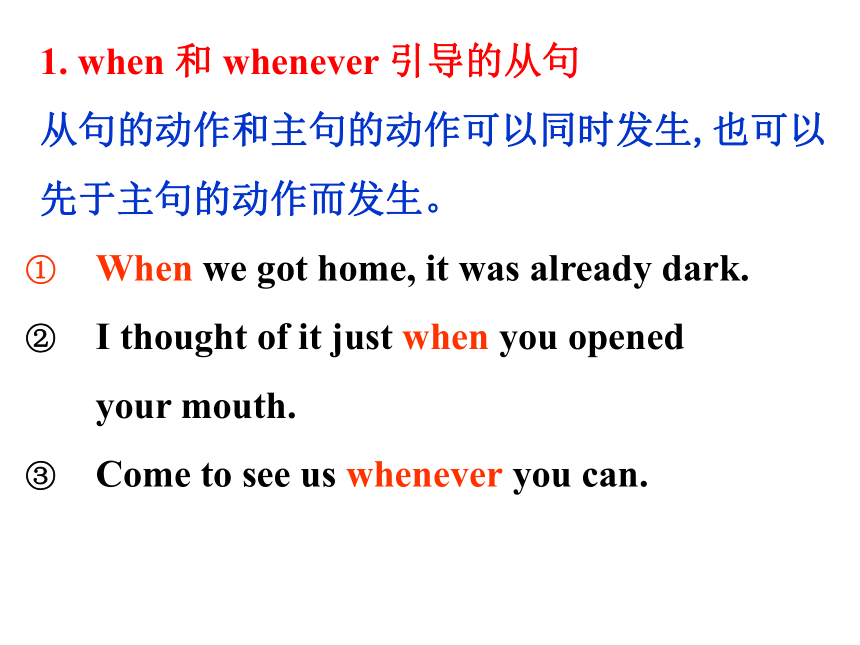
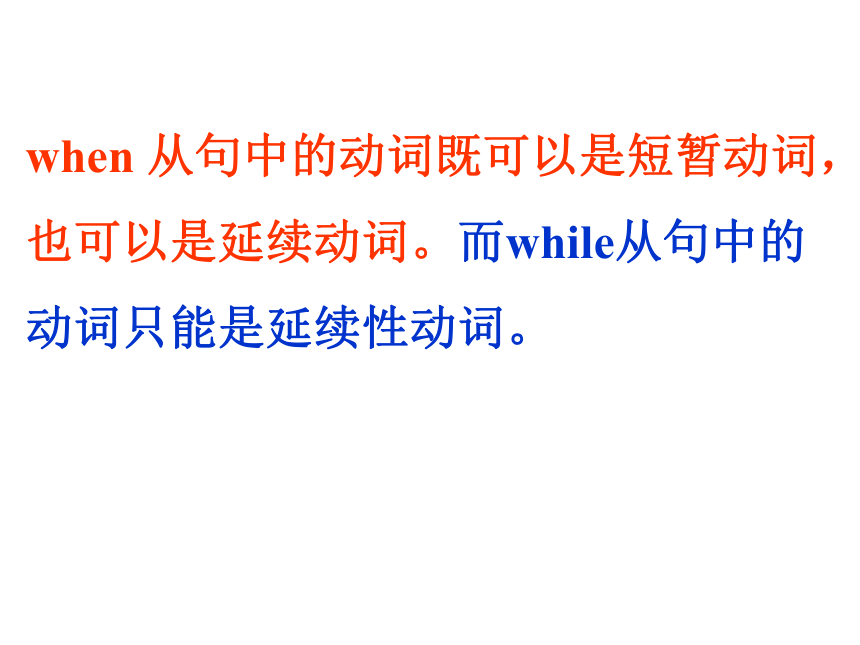
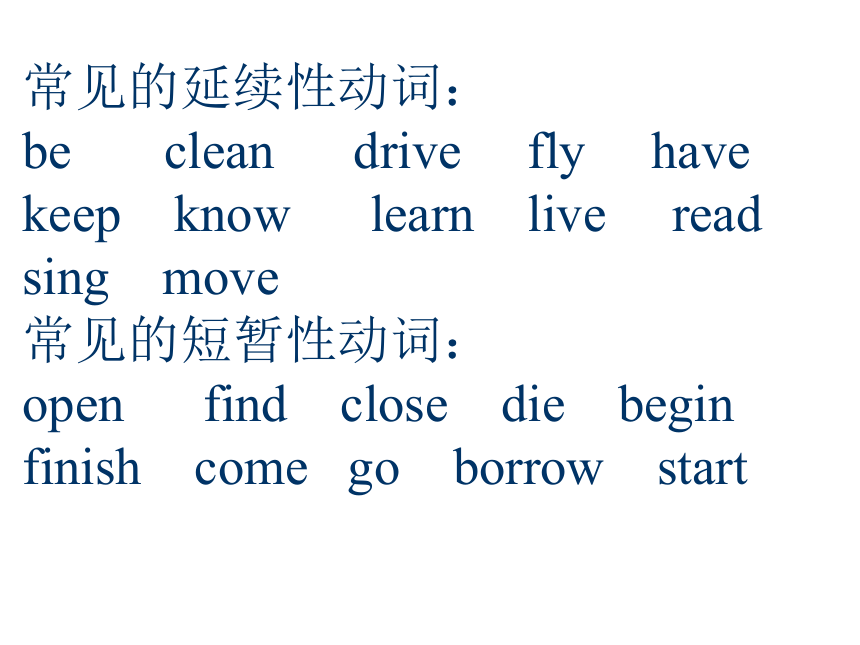
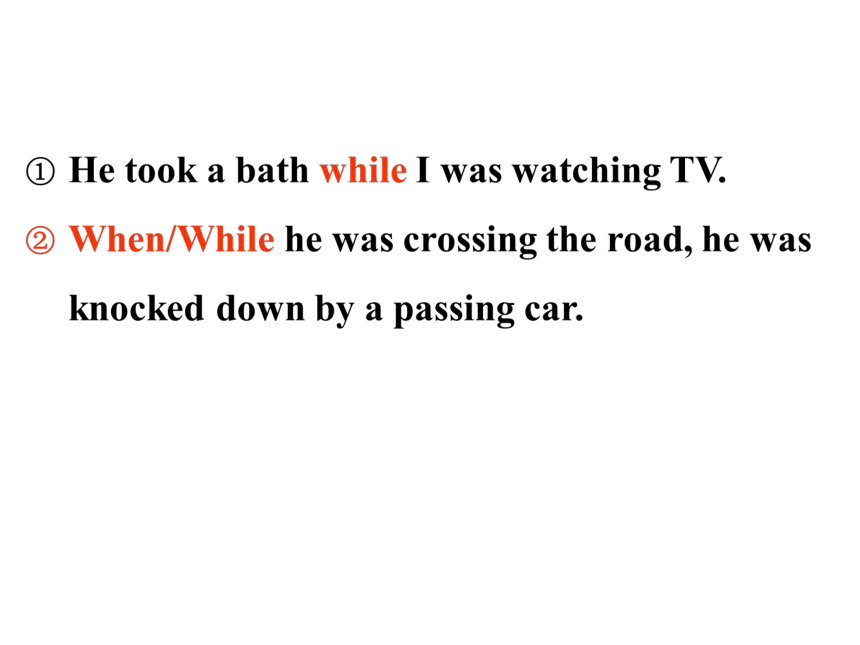
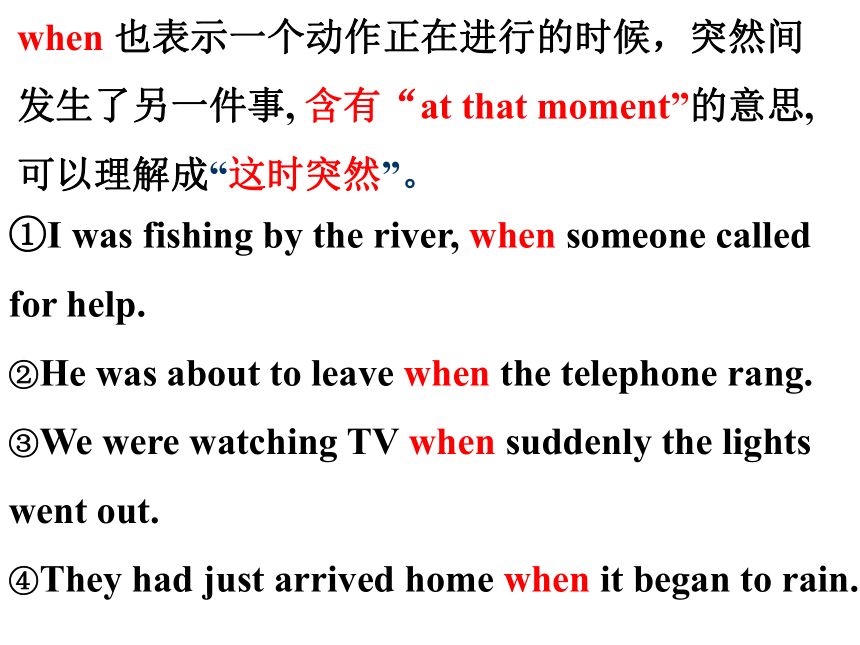
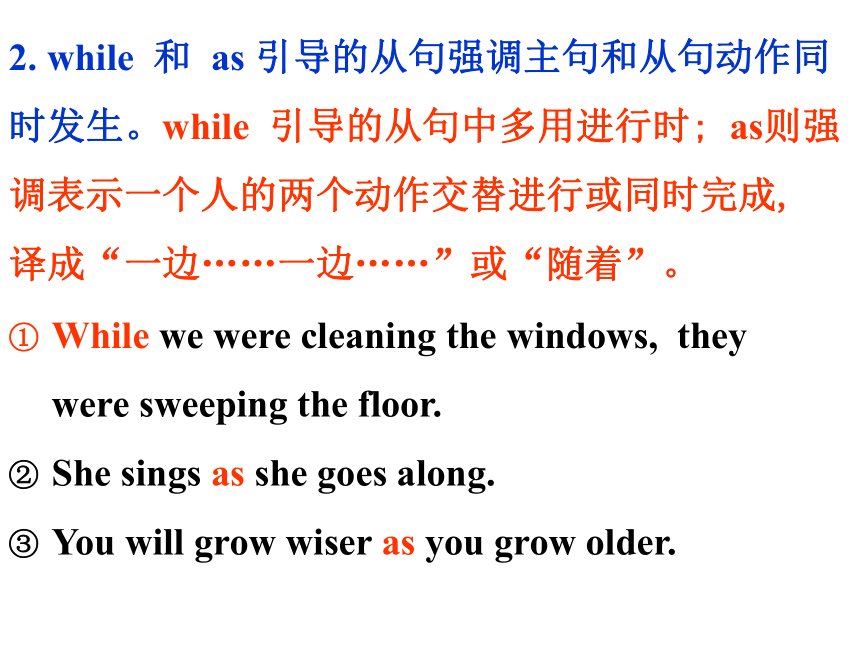
文档简介
课件28张PPT。Adverbial Clause Of TimeModule 3 Grammar时间状语从句定义:由一个完整的句子充当时间状语。时间状语从句常由下列连词引导:
when, while, as, before, after, till, until, since, once, as soon as, whenever, immediately等Whenever we met with difficulties, they would come to help us.
Once you understand the rules of the game, you’ll enjoy it.
The boy cried as soon as he saw his mother.When we got home, it was already dark.
I thought of it just when you opened your mouth.
Come to see us whenever you can.1. when 和 whenever 引导的从句 从句的动作和主句的动作可以同时发生,也可以先于主句的动作而发生。when 从句中的动词既可以是短暂动词,也可以是延续动词。而while从句中的动词只能是延续性动词。常见的延续性动词:
be clean drive fly have keep know learn live read sing move
常见的短暂性动词:
open find close die begin finish come go borrow startwhen 也表示一个动作正在进行的时候,突然间发生了另一件事, 含有“at that moment”的意思, 可以理解成“这时突然”。I was fishing by the river, when someone called for help.
He was about to leave when the telephone rang.
We were watching TV when suddenly the lights went out.
They had just arrived home when it began to rain.2. while 和 as 引导的从句强调主句和从句动作同时发生。while 引导的从句中多用进行时; as则强调表示一个人的两个动作交替进行或同时完成, 译成“一边……一边……”或“随着”。While we were cleaning the windows, they were sweeping the floor.
She sings as she goes along.
You will grow wiser as you grow older.while也表示主从句之间的转折或对比关系, 译为“然而”。
I like listening to music, while my brother likes doing sports.
She thought I was talking about her daughter, while in fact, I was talking about my daughter.
Some people love cats, while others hate them.summaryWhen:
1.从句的动作和主句的动作可以同时发生,也可以先于主句的动作而发生。
2.从句中的动词既可以是短暂动词,也可以是延续动词。
3.表示一个动作正在进行的时候,突然间发生了另一件事, 含有“at that moment”的意思, 可以理解成“这时突然”。
While
1.从句中的动词只能是延续性动词。
2.引导的从句强调主句和从句动作同时发生。while 引导的从句中多用进行时。
3.while也表示主从句之间的转折或对比关系, 译为“然而”。
As
引导的从句强调主句和从句动作同时发生。强调表示一个人的两个动作交替进行或同时完成, 译成“一边……一边……”或“随着”。
3. before 和 after 引导的从句: before表示主句的动作发生在从句动作之前, after表示主句的动作发生在从句动作之后, 从句中常用过去完成时。After he had finished his work, he played chess with his child.
He called me after he had finished his work.
He had ordered us back to work before we finished our meal.4. till 和 until 引导的从句:
表示“直到……时”,主句和从句都为肯定式时,till 和 until均可;表示“直到……才”,主句用否定式,从句用肯定式,一般用until。① They worked till/until it was midnight.
② They were so excited that they didn't fall asleep until it was almost dawn.
③ Not until I shouted at the top of my voice did they become quiet.(主句主语和谓语倒置)5. since 和 ever since 引导的从句表示 “自从……以来”, 从句一般用过去时; 主句用现在完成时或现在完成进行时。We have made many dumplings since we began to cook.
We haven’t seen each other since we parted(分开).
He has been working here ever since he left university.常用句型:
It is/It has been +时间段+since从句(过去时)
自从…以来已经多久了。
It is six years since she graduated from the university.I’ll tell you about it the moment you come.
I’m going to see him next time he comes to Shanghai.
I got in touch with him immediately I received his letter.
The first time I saw him, he was working in a factory.
He didn’t tell me anything the last time I saw him.7. hardly…when…, no sooner…than… 一……就……,刚……就……主句用过去完成时。
hardly或no sooner位于句首时主句用部分倒装。We had hardly begun when they asked us to stop.
We had no sooner begun than they asked us to stop.
Hardly had I got home when it began to rain.
No sooner had I got home than it began to rain.8. 在时间状语从句或条件状语从句中要 用现在时表将来。
He will fail in the exam if he doesn't study hard.
When I see him, I will tell him the news.
I will come to see you as soon as I come back.The Past Perfect Tense过去完成时表示在过去某一时间或动作之前已经发生或完成的动作,或在过去某一时间之前已经开始并一直持续到那时的动作或状态。构成形式:had +过去分词
1.过去完成时常与by, for, before, since等介词短语或由after, before, since, when, by the time等引导的时间状语从句连用。
By the end of last week she had written two papers.
I had seen her before she saw me.2. intend, mean, hope, want, plan, think, suppose, expect等动词的过去完成时可以用来表示一个本来打算做而没有做的事。
I had intended to call on you yesterday, but someone came to see me just when I was about to leave.
He had wanted to help you but he had no time then.3.hope, expect, think, want等词的过去完成时常用于比较结构中。
Things went more smoothly than we had hoped.
The TV play wasn’t as interesting as we had wanted it to be.
4.It was the first/second/…/last time + (that) + sb. had done sth.句中用过去完成时
It was the first time he had lost the game.
It was the third time he had dined out with her.1. — How long _____ each other before they ______ married?
— For about a year.
have they known; get
did they know; going to get
do they know; are going to get
had they known; gotDExercise 2. By the time he was twelve, Edison ___ to make a living by himself.
A. living by himself? B. has begun??
C. had begun? ???????? D. was begun
3. That dinner was the most expensive meal we _____. A. would have B. have had
C. had never had D. had ever hadCD4. Tom was disappointed that most of the guests ______ when he _____ at the party. A. left; had arrived
B. left; arrived
C. had left; had arrived
D. had left; arrivedD5. When Jack arrived he learned Mary ____ for almost an hour. A. had gone
B. has set off
C. had left
D. had been awayD6. Helen _____ her key in the office so she had to wait until her husband ____ home. A. has left; comes
B. left; had come
C. had left; came
D. had left; would comeC
when, while, as, before, after, till, until, since, once, as soon as, whenever, immediately等Whenever we met with difficulties, they would come to help us.
Once you understand the rules of the game, you’ll enjoy it.
The boy cried as soon as he saw his mother.When we got home, it was already dark.
I thought of it just when you opened your mouth.
Come to see us whenever you can.1. when 和 whenever 引导的从句 从句的动作和主句的动作可以同时发生,也可以先于主句的动作而发生。when 从句中的动词既可以是短暂动词,也可以是延续动词。而while从句中的动词只能是延续性动词。常见的延续性动词:
be clean drive fly have keep know learn live read sing move
常见的短暂性动词:
open find close die begin finish come go borrow startwhen 也表示一个动作正在进行的时候,突然间发生了另一件事, 含有“at that moment”的意思, 可以理解成“这时突然”。I was fishing by the river, when someone called for help.
He was about to leave when the telephone rang.
We were watching TV when suddenly the lights went out.
They had just arrived home when it began to rain.2. while 和 as 引导的从句强调主句和从句动作同时发生。while 引导的从句中多用进行时; as则强调表示一个人的两个动作交替进行或同时完成, 译成“一边……一边……”或“随着”。While we were cleaning the windows, they were sweeping the floor.
She sings as she goes along.
You will grow wiser as you grow older.while也表示主从句之间的转折或对比关系, 译为“然而”。
I like listening to music, while my brother likes doing sports.
She thought I was talking about her daughter, while in fact, I was talking about my daughter.
Some people love cats, while others hate them.summaryWhen:
1.从句的动作和主句的动作可以同时发生,也可以先于主句的动作而发生。
2.从句中的动词既可以是短暂动词,也可以是延续动词。
3.表示一个动作正在进行的时候,突然间发生了另一件事, 含有“at that moment”的意思, 可以理解成“这时突然”。
While
1.从句中的动词只能是延续性动词。
2.引导的从句强调主句和从句动作同时发生。while 引导的从句中多用进行时。
3.while也表示主从句之间的转折或对比关系, 译为“然而”。
As
引导的从句强调主句和从句动作同时发生。强调表示一个人的两个动作交替进行或同时完成, 译成“一边……一边……”或“随着”。
3. before 和 after 引导的从句: before表示主句的动作发生在从句动作之前, after表示主句的动作发生在从句动作之后, 从句中常用过去完成时。After he had finished his work, he played chess with his child.
He called me after he had finished his work.
He had ordered us back to work before we finished our meal.4. till 和 until 引导的从句:
表示“直到……时”,主句和从句都为肯定式时,till 和 until均可;表示“直到……才”,主句用否定式,从句用肯定式,一般用until。① They worked till/until it was midnight.
② They were so excited that they didn't fall asleep until it was almost dawn.
③ Not until I shouted at the top of my voice did they become quiet.(主句主语和谓语倒置)5. since 和 ever since 引导的从句表示 “自从……以来”, 从句一般用过去时; 主句用现在完成时或现在完成进行时。We have made many dumplings since we began to cook.
We haven’t seen each other since we parted(分开).
He has been working here ever since he left university.常用句型:
It is/It has been +时间段+since从句(过去时)
自从…以来已经多久了。
It is six years since she graduated from the university.I’ll tell you about it the moment you come.
I’m going to see him next time he comes to Shanghai.
I got in touch with him immediately I received his letter.
The first time I saw him, he was working in a factory.
He didn’t tell me anything the last time I saw him.7. hardly…when…, no sooner…than… 一……就……,刚……就……主句用过去完成时。
hardly或no sooner位于句首时主句用部分倒装。We had hardly begun when they asked us to stop.
We had no sooner begun than they asked us to stop.
Hardly had I got home when it began to rain.
No sooner had I got home than it began to rain.8. 在时间状语从句或条件状语从句中要 用现在时表将来。
He will fail in the exam if he doesn't study hard.
When I see him, I will tell him the news.
I will come to see you as soon as I come back.The Past Perfect Tense过去完成时表示在过去某一时间或动作之前已经发生或完成的动作,或在过去某一时间之前已经开始并一直持续到那时的动作或状态。构成形式:had +过去分词
1.过去完成时常与by, for, before, since等介词短语或由after, before, since, when, by the time等引导的时间状语从句连用。
By the end of last week she had written two papers.
I had seen her before she saw me.2. intend, mean, hope, want, plan, think, suppose, expect等动词的过去完成时可以用来表示一个本来打算做而没有做的事。
I had intended to call on you yesterday, but someone came to see me just when I was about to leave.
He had wanted to help you but he had no time then.3.hope, expect, think, want等词的过去完成时常用于比较结构中。
Things went more smoothly than we had hoped.
The TV play wasn’t as interesting as we had wanted it to be.
4.It was the first/second/…/last time + (that) + sb. had done sth.句中用过去完成时
It was the first time he had lost the game.
It was the third time he had dined out with her.1. — How long _____ each other before they ______ married?
— For about a year.
have they known; get
did they know; going to get
do they know; are going to get
had they known; gotDExercise 2. By the time he was twelve, Edison ___ to make a living by himself.
A. living by himself? B. has begun??
C. had begun? ???????? D. was begun
3. That dinner was the most expensive meal we _____. A. would have B. have had
C. had never had D. had ever hadCD4. Tom was disappointed that most of the guests ______ when he _____ at the party. A. left; had arrived
B. left; arrived
C. had left; had arrived
D. had left; arrivedD5. When Jack arrived he learned Mary ____ for almost an hour. A. had gone
B. has set off
C. had left
D. had been awayD6. Helen _____ her key in the office so she had to wait until her husband ____ home. A. has left; comes
B. left; had come
C. had left; came
D. had left; would comeC
